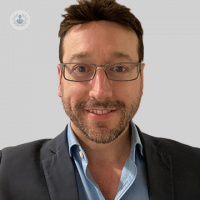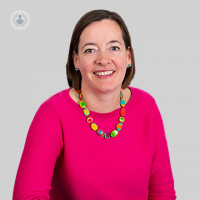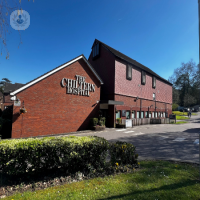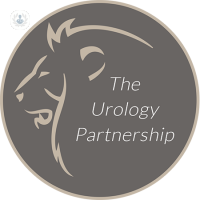What is cryptorchidism?
An undescended testicle, medically known as cryptorchidism, is a common condition in young male children where one of the testicles has not moved into its usual position in the scrotum. It can occur with one (unilateral cryptorchidism) or both (bilateral cryptorchidism) testes.
It is a problem that is thought to affect approximately 4% of baby boys, although in most cases the testicle(s) will descend of its own accord in the first six months after birth.
An undescended testicle may be in one of a number of places:
- Along the path of descent (in the abdomen, below the kidney, before the inguinal ring)
- In the inguinal canal (the passage above the scrotum that contains the spermatic cord)
- Outside the normal path of descent and inguinal canal – these ectopic testes have “wandered” during their descent and ended up in the wrong place, such as within the lower abdomen, under the skin of the thigh, the perineum, or even in the wrong part of the scrotum.
In some cases, a testicle may be absent altogether, a condition known as monorchism.
Cryptorchidism is usually treated by a paediatric surgeon or urologist.

Symptoms of an undescended testicle
Undescended testicles are usually diagnosed physically by the doctor. The only real symptom is the physical absence of the testicle in the scrotum. However, this physical examination can be difficult with a small baby, so the doctor may refer the child to a paediatric surgeon if concerned about possible cryptorchidism.
If the testicle cannot be located physically, the doctors may run scans, tests, or even laparoscopic (keyhole) surgery to locate it.
If the testicles haven’t descended by themselves by six months of age, they are unlikely to and treatment is usually recommended, as if they are left in the abdomen they can lead to complications, such as fertility problems later in life and increase the risk of testicular cancer.
Causes of cryptorchidism
Undescended testicles occur more frequently in premature babies. Family history of the condition is also a risk factor.
What is the treatment for cryptorchidism?
If the testicles have not descended by themselves after six months, treatment may be required.
An operation called an orchidopexy is a surgical treatment to move the undescended testicles into their correct position in the scrotum. This is usually performed in the first year of the child’s life, as the sooner it is done, the lower the risk of fertility problems and testicular cancer in later life.
02-21-2018 11-15-2024Undescended testicle (Cryptorchidism)
Mr Simon Clarke - Paediatric surgery
Created on: 02-21-2018
Updated on: 11-15-2024
Edited by: Jay Staniland
What is cryptorchidism?
An undescended testicle, medically known as cryptorchidism, is a common condition in young male children where one of the testicles has not moved into its usual position in the scrotum. It can occur with one (unilateral cryptorchidism) or both (bilateral cryptorchidism) testes.
It is a problem that is thought to affect approximately 4% of baby boys, although in most cases the testicle(s) will descend of its own accord in the first six months after birth.
An undescended testicle may be in one of a number of places:
- Along the path of descent (in the abdomen, below the kidney, before the inguinal ring)
- In the inguinal canal (the passage above the scrotum that contains the spermatic cord)
- Outside the normal path of descent and inguinal canal – these ectopic testes have “wandered” during their descent and ended up in the wrong place, such as within the lower abdomen, under the skin of the thigh, the perineum, or even in the wrong part of the scrotum.
In some cases, a testicle may be absent altogether, a condition known as monorchism.
Cryptorchidism is usually treated by a paediatric surgeon or urologist.

Symptoms of an undescended testicle
Undescended testicles are usually diagnosed physically by the doctor. The only real symptom is the physical absence of the testicle in the scrotum. However, this physical examination can be difficult with a small baby, so the doctor may refer the child to a paediatric surgeon if concerned about possible cryptorchidism.
If the testicle cannot be located physically, the doctors may run scans, tests, or even laparoscopic (keyhole) surgery to locate it.
If the testicles haven’t descended by themselves by six months of age, they are unlikely to and treatment is usually recommended, as if they are left in the abdomen they can lead to complications, such as fertility problems later in life and increase the risk of testicular cancer.
Causes of cryptorchidism
Undescended testicles occur more frequently in premature babies. Family history of the condition is also a risk factor.
What is the treatment for cryptorchidism?
If the testicles have not descended by themselves after six months, treatment may be required.
An operation called an orchidopexy is a surgical treatment to move the undescended testicles into their correct position in the scrotum. This is usually performed in the first year of the child’s life, as the sooner it is done, the lower the risk of fertility problems and testicular cancer in later life.
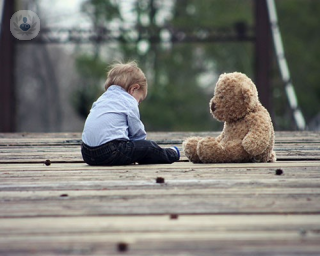

What age do the testes descend?
By Miss Marie-Klaire Farrugia
2025-01-13
Leading paediatric urological surgeon, Miss Marie-Klaire Farrugia explains what to do if your child’s testicle hasn’t descended at birth. See more


Addressing the complexities of Testicular Cancer
By Mr Ashwin Sridhar
2025-01-13
Testicular cancer is a complex disease with various facets that demand attention for effective management. In his latest online article, Mr Ashwin Sridhar explores the early signs, risk factors, diagnosis, treatment options, and long-term effects of this condition. See more


Ask an expert: How serious is an undescended testicle?
By Mr Alex Turner
2025-01-13
Leading consultant paediatric urologist and surgeon Mr Alex Turner gives an all-you-need-to-know guide to undescended testicles in babies and young boys in this informative article. See more
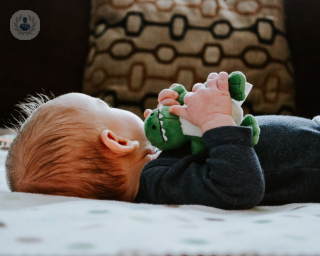

Undescended testicles: how are they treated?
By Mr Simon Clarke
2025-01-13
Leading paediatric surgeon, Mr Simon Clarke, spoke to us about all the symptoms of undescended testicles, how the condition is diagnosed, how common it is and when it should be treated. We found out details on orchidopexy and how children who need to have the surgery, should prepare. See more
Experts in Undescended testicle (Cryptorchidism)
-
Mr Neil Haldar
UrologyExpert in:
- Bladder cancer
- Urinary tract infection
- Undescended testicle (Cryptorchidism)
- Prostate cancer
- Paediatric urology
- Kidney cancer
-
Mr Simon Clarke
Paediatric surgeryExpert in:
- Hernia
- Undescended testicle (Cryptorchidism)
- Circumcision
- Thoracic surgery
- Laparoscopy
-
Mr Alex Turner
Paediatric urologyExpert in:
- Urinary tract infection
- Bladder problems
- Paediatric urology
- Paediatrics
- Undescended testicle (Cryptorchidism)
- Vesicoureteral reflux (VUR) (kidney reflux)
-
Mr Dan Higman
Paediatric surgeryExpert in:
- Circumcision
- Nail diseases
- Undescended testicle (Cryptorchidism)
- Hydrocele
- Umbilical hernia
- Hernia
-
Ms Johanna Thomas
UrologyExpert in:
- Paediatric urology
- Undescended testicle (Cryptorchidism)
- Foreskin problems
- Urinary tract infection
- Laser lithotripsy
- Kidney stones
- See all

The Chiltern Hospital - part of Circle Health Group
The Chiltern Hospital - part of Circle Health Group
London Rd, Great Missenden HP16 0EN
No existe teléfono en el centro.
By using the telephone number provided by TOP DOCTORS, you automatically agree to let us use your phone number for statistical and commercial purposes. For further information, read our Privacy Policy
Top Doctors

The Portland Hospital - part of HCA Healthcare
The Portland Hospital - part of HCA Healthcare
205 - 209 Great Portland St. W1W 5AH
No existe teléfono en el centro.
By using the telephone number provided by TOP DOCTORS, you automatically agree to let us use your phone number for statistical and commercial purposes. For further information, read our Privacy Policy
Top Doctors

The Urology Partnership
The Urology Partnership
11 Kendrick Road Reading, RG1 5DU
No existe teléfono en el centro.
By using the telephone number provided by TOP DOCTORS, you automatically agree to let us use your phone number for statistical and commercial purposes. For further information, read our Privacy Policy
Top Doctors
-
The Chiltern Hospital - part of Circle Health Group
London Rd, Great Missenden HP16 0EN, Great MissendenExpert in:
- Allergies Ophthalmological
- Clinical analysis
- Cancer
- Breast Cancer
- Skin Cancer
- Prostate Cancer
-
The Portland Hospital - part of HCA Healthcare
205 - 209 Great Portland St. W1W 5AH, Central LondonExpert in:
- Neurological spinal surgery
- Orthopaedic spinal surgery
- Maternity care
- Pregnancy
- Scoliosis
- In vitro fertilisation (IVF)
-
The Urology Partnership
11 Kendrick Road Reading, RG1 5DU, ReadingExpert in:
- Aquablation
- Kidney stones (Urolithiasis)
- Prostate Cancer
- Kidney Cancer
- Urinary Incontinence
- Urology
- See all
- Most viewed diseases, medical tests, and treatments
- Fertility preservation
- Female infertility
- Testicular ultrasound
- Abdominal pain
- Minimal access surgery (keyhole surgery)
- NanoKnife
- Vaginal dryness
- Pelvic pain syndrome
- Kidney stones
- Medicolegal


